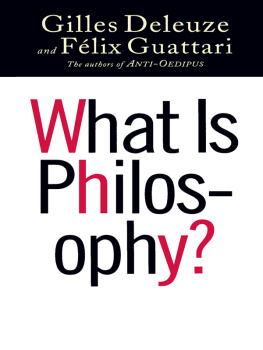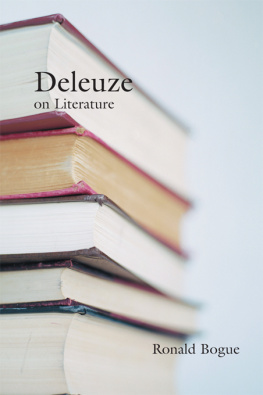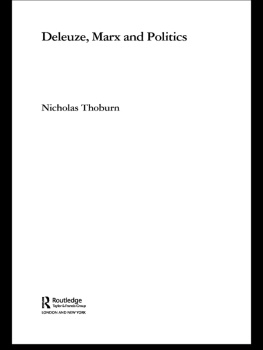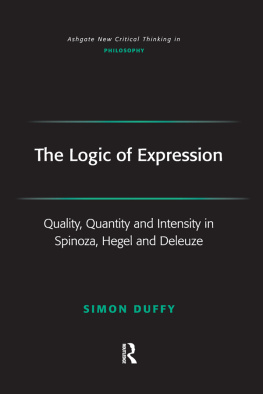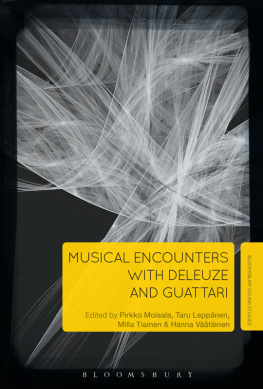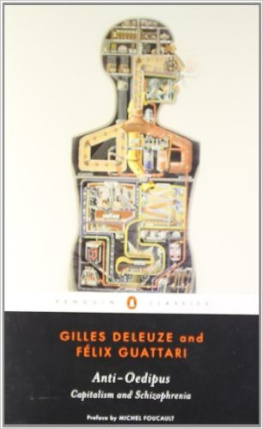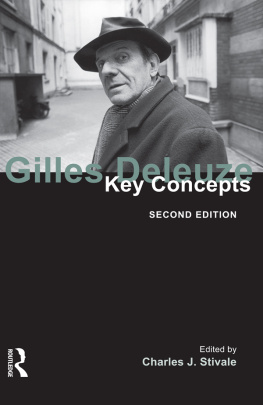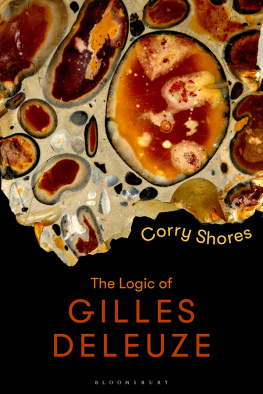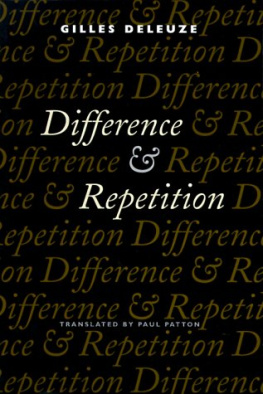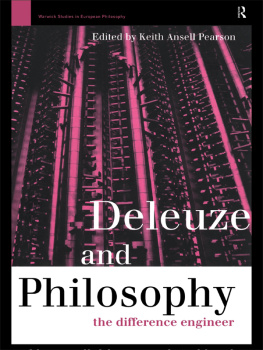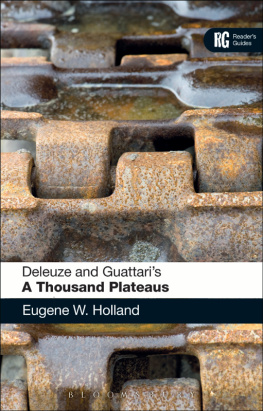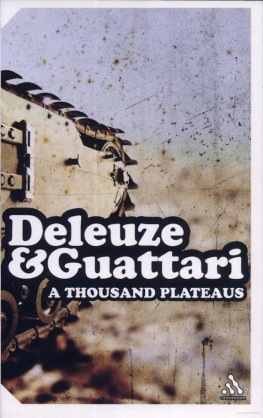What Is Philosophy?
European Perspectives
European Perspectives
A Series in Social Thought and Cultural Criticism
Lawrence D. Kritzman, Editor
European Perspectives presents outstanding books by leading European thinkers. With both classic and contemporary works, the series aims to shape the major intellectual controversies of our day and to facilitate the tasks of historical understanding.
A complete series list follows the index.
Gilles Deleuze & Flix Guattari
What Is Philosophy?
Translated by Hugh Tomlinson and Graham Burchell
Columbia University Press New York
Columbia University Press wishes to express its appreciation of assistance given by the government of France through Le Ministre de la Culture in the preparation of this translation.
COLUMBIA UNIVERSITY PRESS
NEW YORK CHICHESTER, WEST SUSSEX
Quest-ce que la philosophie? 1991 by Les Editions de Minuit. Translation 1994 Columbia University Press
All rights reserved
E-ISBN 978-0-231-53066-8
Library of Congress Cataloging-in-Publication Data
Deleuze, Gilles.
[Quest-ce que la philosophie? English]
What is philosophy? / Gilles Deleuze and Flix Guattari; translated by Hugh Tomlinson and Graham Burchell.
p. cm.(European perspectives)
Includes bibliographical references and index.
ISBN 978-0-231-07989-1
1. Philosophy. 2. Science. 3. Logic. 4. Aesthetics. I. Guattari, Flix. II. Title. III. Series.
B2430.D453Q4713 1994
100dc20
9340801
CIP
A Columbia University Press E-book.
CUP would be pleased to hear about your reading experience with this e-book at .
Contents
For nearly twenty years, the jointly signed works of Gilles Deleuze and Flix Guattari
The interaction with Guattari the nonphilosopher brought the philosopher Deleuze to a new stage: from thinking the multiple to doing the multiple.
This process of a parallel evolution is exemplified in the conceptual vitalism of this book. Deleuze and Guattari are the thinkers of lines of flight, of the openings that allow thought to escape from the constraints that seek to define and enclose creativity. This conception and practice of philosophy as conceptual creation poses some special difficulties for the translator, as
some concepts must be indicated by an extraordinary and sometimes even barbarous or shocking word, whereas others make do with an ordinary, everyday word that is filled with harmonics so distant that it risks being imperceptible to a nonphilosophical ear. Some concepts call for archaisms, and others for neologisms, shot through with almost crazy etymological exercises.
In translating such words our first aim has been consistency. We have sought to use the same English word on each occasion. Furthermore, we have tried to avoid departure from other recent translations of Deleuze and Guattaris works. The translation of these key terms is marked with translators notes. We have tried to keep such notes to a minimum; they are indicated by an asterisk and appear at the bottom of the page.
A number of terms used throughout the book present particular difficulties. There are various English translations of chiffre, for example. These include figure, numeral, sum total, initials or monogram, secret code or cipher. None of these capture the philosophical use of the word in the present work. In most instances, we have rendered chiffre as combination to indicate an identifying numeral (in the sense of the combination of a safe or an opus number, as in music) of a multiplicity, but which is not, however, a number in the sense of a measure.
The word voisinage here has the general sense of neighborhood but also its mathematical sense, as in neighborhood of a point, which in a linear set (for example, the points of a straight line) is an open segment containing this point. Ordonne can have the general sense of ordered. Deleuze and Guattari also use the word in the more technical sense of ordinate (as in the vertical, or y-coordinate of Cartesian geometry) in contrast with abscissa (the horizontal or x-coordinate).
We would like to thank all those who have given us support and assistance, including in particular Martin Joughin and Michle Le Duf. Finally, we would like to thank our editors at Columbia University Press for their assistance and persistence in the face of our continual attempts to deterritorialize their schedules. This translation is dedicated to Georgia and Felix and to Bebb.
Hugh Tomlinson
Graham Burchell
. In order of original publication these are Anti-Oedipus, trans. Robert Hurley, Mark Seem, and Helen R. Lane (Minneapolis: University of Minnesota Press, 1983); Kafka: Toward a Minor Literature, trans. Dana Polan (Minneapolis: University of Minnesota Press, 1986); A Thousand Plateaus, trans. Brian Massumi (Minneapolis: University of Minnesota Press, 1987).
. For a general discussion of this book see Eric Alliez, La Signature du Monde: ou, Quest-ce que la philosophie de Deleuze et Guattari? (Paris: Editions du Cerf, 1993).
. Deleuzes own production shows no sign of diminishing after forty years of writing. His latest work, Critique et Clinique (Paris: Minuit, 1993) was published on September 8, 1993. He is at present writing a work on the greatness of Marx.
. Gilles Deleuze and Claire Parnet, Dialogues, trans. Hugh Tomlinson and Barbara Habberjam (Minneapolis: University of Minnesota Press, 1987), p. 17.
. Ibid., pp. 78.
. In Neo-Finalisme (Paris: PUF, 1952), especially chap. 9.
. See also Gilles Deleuze, The Logic of Sense, trans. Mark Lester (New York: Columbia University Press, 1990), in which survolant is translated as surveying.
The question what is philosophy? can perhaps be posed only late in life, with the arrival of old age and the time for speaking concretely. In fact, the bibliography on the nature of philosophy is very limited. It is a question posed in a moment of quiet restlessness, at midnight, when there is no longer anything to ask. It was asked before; it was always being asked, but too indirectly or obliquely; the question was too artificial, too abstract. Instead of being seized by it, those who asked the question set it out and controlled it in passing. They were not sober enough. There was too much desire to

